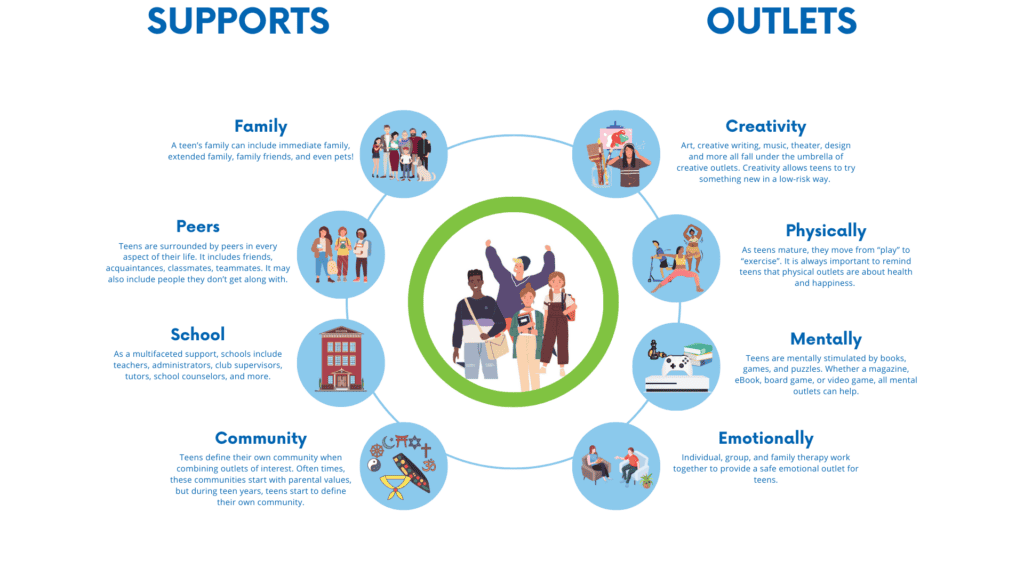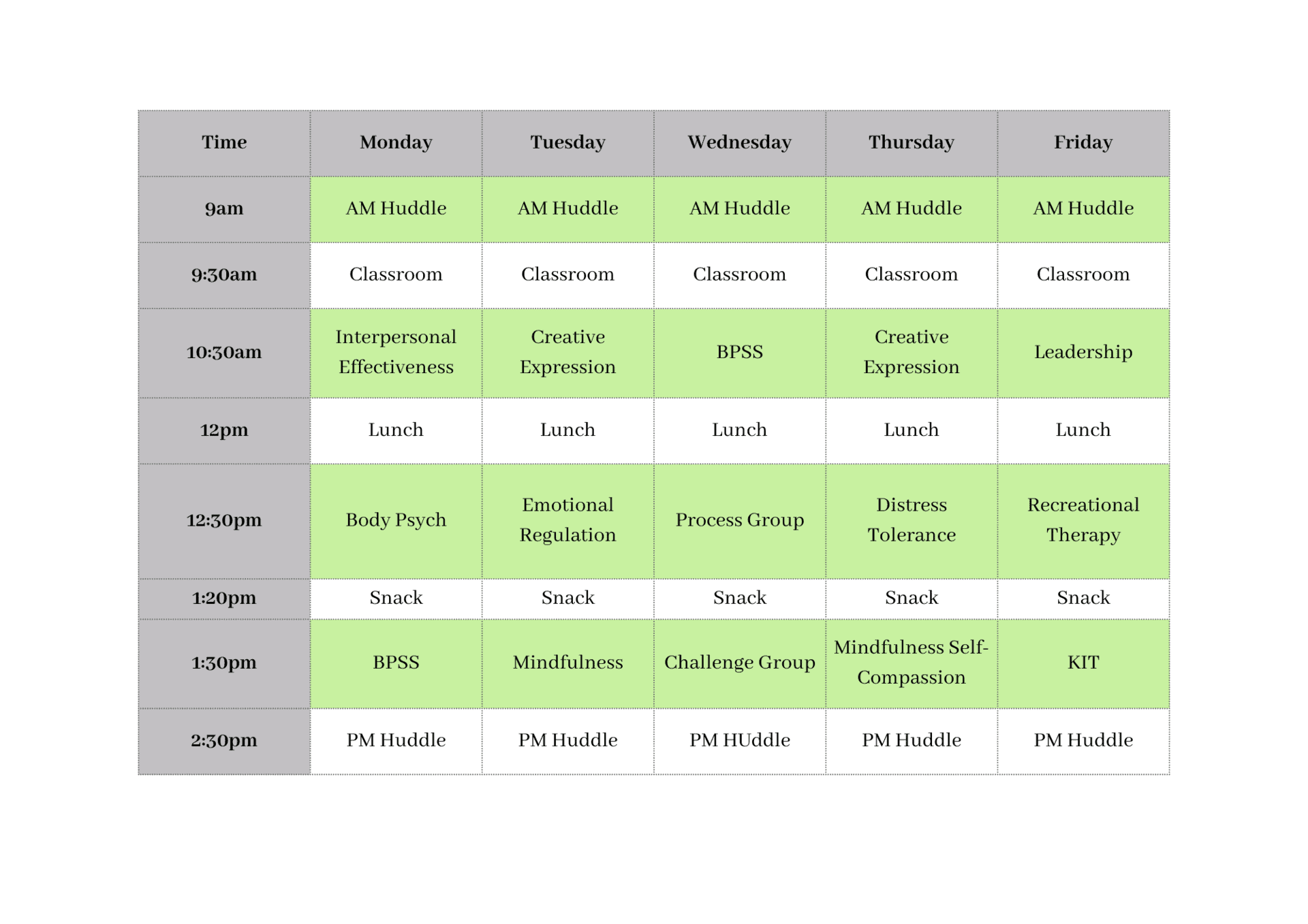With PHP, teens are able to receive intensive mental health treatment while continuing to live at home In North Carolina.
Our partial hospitalization program (PHP) also referred to as day treatment is a less restrictive, yet intensive treatment service for teens (13-18) with significant and serious mental and/or emotional issues. Treatment includes individual and family therapy, medication management, mental health education, skills training, education coordination, and other activities. As mid-level treatment, PHP supports teens “stepping down” from inpatient care or serves as a “step up” if they need more support than outpatient therapy can provide.
Partial hospitalization allows teens to make mental health a priority in their lives. They accomplish this with a targeted, skills-focused group therapy curriculum. PHP treatment is five days per week from 9am-3pm. As a result of the high frequency and family support, teens can more quickly reach their goals. Our goal is to get teens back to their lives quickly, with even more understanding of themselves and more effective skills and coping strategies.

Who Is A Fit For Our PHP Program In North Carolina?
Our partial hospitalization program was created to help teens target serious mental health challenges that interfere with their daily lives. The teens we help are usually struggling with symptoms of one or more of the following:
- depression
- intense anxiety
- self-harm
- OCD
- trauma
- severe ADHD
- mood dysregulation
- suicidal thoughts
Our strengths-based programming is based in the belief that it’s completely possible to live a full, constructive life with a mental health diagnosis. To help teens get there, we focus on the following: mental health education, symptom management, personal expression, life and leadership skills, and building supportive relationships.
Mental Health Partial Hospitalization Program Schedule
While our schedule may change, here’s an example of how we run things. We start and end the day with a clinician-led huddle and have three more therapy groups throughout the day. There’s also some time for checking in on schoolwork and a break for lunch.

You might get a good idea of some of our groups based on their name. Others, like BPSS and EBT, aren’t as obvious. BPSS is our education group focusing on many different aspects of mental, physical, and emotional health. In EBT, we explore the core concepts from evidence-based treatment models, such as Dialectical Behavior Therapy, Cognitive Behavior Therapy, and Acceptance and Commitment Therapy. Whether the therapy group is creative, process-based, or classroom-style, we get input from our current patient cohort about the topics and activities that are most interesting to them.
What Happens In Treatment?
Partial hospitalization for teens includes multiple types of services. In addition to daily group therapy, your teen will also be assigned to a primary therapist. This therapist will provide individual therapy for your teen and family therapy for everyone supporting your teen through treatment. Your teen will also receive weekly consultations with their psychiatric provider.
It’s important to keep in mind that partial hospitalization is not just about your teen. The family involvement required to support a teen at this level of care is significant. Your team will help you with the recommendations specific to your family and your situation. Teens in PHP typically benefit most from treatment when their family members are also highly engaged.
Group Counseling
During PHP, we create different types of therapeutic practices to maximize effectiveness and empower the teenagers in attendance. Some of the group therapies we use are as listed here:
- Creative Expression Groups Patients use creative means of expression to promote self-exploration, self-awareness, and emotional growth. Creative expression groups can range from creating your safe place which challenges the patients to reflect on things that make them feel safe to creating your mental illness creature which allows the patients to use art to express how they experience their mental health rather than words!
- Challenge Groups Patients will be assigned difficult collaborative tasks that require use of learned coping skills to challenge them to practice, explore, and strengthen their effectiveness with various coping skills in a variety of different activities. Challenge groups can include time management activities that focus on teamwork, managing stress, and communication.
- Behavior Chain Analysis Groups Patients will learn to recognize contributing factors to behaviors in order to increase insight to changes they can make. They may also engage in activities in order to practice and explore their understanding of the concept.
- Emotion Regulation Groups Patients will learn DBT-informed Emotion Regulation skills in order to understand the function of emotions, the action urge that accompanies each emotion, and when to follow or oppose these urges. They may also engage in activities that aid in practicing, exploring, and strengthening their understanding of the concept.
- Interpersonal Effectiveness Groups Patients will learn DBT-informed interpersonal effectiveness skills to build and maintain healthy relationships, develop assertiveness and boundary-setting skills, as well as effectively obtain goals in interpersonal encounters. Patients engage in various activities to practice and explore their understanding of the concept.
Where Do Patients Come From?
The majority of patients are local to Wake Forest or commute from Raleigh, Durham, Greensboro, Chapel Hill, and Wilmington North Carolina.
What Happens After PHP?
After PHP patients graduate to intensive outpatient therapy where they attend group counseling 5 times per week. Our teen intensive outpatient program is a less intensive form of treatment that does not last the entire day. Each group is 3 hours per weekday.
Get Started With Teen Mental Health Day Treatment In Wake Forest
At Bright Path Mental Health Rehab Center in North Carolina, we cultivate an inclusive, warm healing environment in our mental health partial hospitalization program. This setting allows teens to gain effective skills and self-empower themselves for a brighter future. This form of treatment allows teens to receive intensive mental health care while continuing to live at home. We serve clients from Raleigh, Durham, Wake Forest, and the greater Chapel Hill area with our convenient location in the Triangle. If you or your teen are struggling, reach out to us. We’re here to help.






